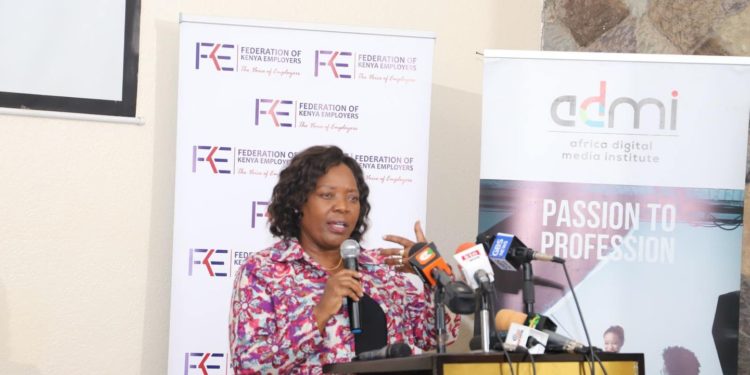A comprehensive survey conducted by the Federation of Kenya Employers during March-April 2023 has unveiled the evolving demands within the nation’s workforce. Covering 521 enterprises across diverse sectors, the study sheds light on the changing landscape of skill requirements, focusing on Information Communication and Technology (ICT), green competence, and challenges associated with hard-to-fill vacancies.
“Labour market dynamics are evolving faster than ever and the mismatch between workers’ skills and those required by available jobs has become a top priority policy concern. As such, many employers report difficulties finding suitably skilled workers, even though the unemployment rate is high,” said Jacqueline Mugo, CEO Federation of Kenya Employers in response to the survey.
Read more: Teleposta Pension Scheme wins legal battle over disputed Thika Town parcel
The survey indicates a diversified demand for skills, with Information Technology (35%), Finance & Business Management (33.9%), Engineering (23.7%), Transportation, Distribution & Logistics (23%), and Legal (22.5%) emerging as the top fields seeking specialized expertise.
In terms of educational prerequisites, the majority of sought-after fields required an undergraduate degree (43.8%), while Technical and Vocational Education and Training (TVET) played a significant role at 34.9%. Secondary education sufficed for sectors like Public Safety, Corrections & Security (12%) and Arts & Recreational Service (14%).
Respondent enterprises emphasized the importance of TVET skills, particularly in Transport and Logistics (21.3%), Electrical (21.1%), and Building and Construction (18.2%).
Approximately 45% of enterprises demonstrated competency in ICT, highlighting the need for skills in digital platform communication (37.6%), electronics, machine ware, smart components, and communication technology (34.5%), and digital security (33%).
The survey revealed a notable trend as 50.4% of enterprises expressed intentions to make their products/services more environmentally friendly. Leadership competence (34.27%) and skilled worker competence (35.64%) were identified as essential for a successful green shift.
Around 20% of enterprises reported grappling with hard-to-fill vacancies. In response, 50.51% opted to hire applicants with qualifications lower than initially sought, with the Manufacturing sector facing the most significant challenges.
Challenges identified included a lack of qualified candidates in the region (29%) and high salary expectations (26%). Consequences of skill deficits included inhibiting business expansion (25%), revenue loss (24%), and loss of customers or market share (21%).
Read more: Rystad Energy Report: Africa to invest USD 35 billion in geothermal sector
The survey’s recommendations emphasize the need to empower TVET institutions, particularly in areas related to engineering and information. Collaborative efforts between training institutions and employers, including industry-oriented attachments, internships, and apprenticeships, were emphasized to align graduate skills with industry needs.
Email your news TIPS to sharpdailyke@gmail.com










